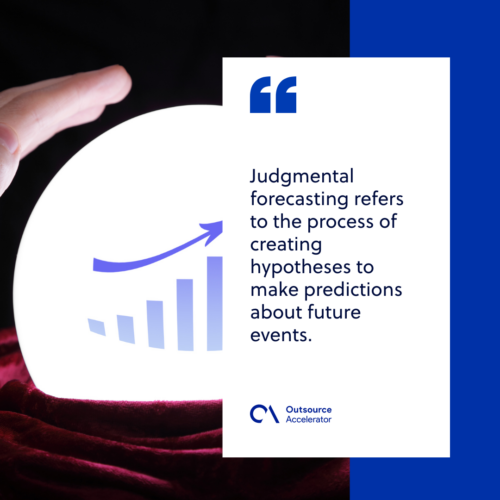Judgmental forecasting
Definition
What is judgmental forecasting?
Judgmental forecasting refers to the process of creating hypotheses to make predictions about future events. This process refers to past and present data to back up projected outcomes.
Without historical data as backup, it would be impossible for executives to reflect on reports and predictions.
By creating educated predictions, business analysts and business intelligence (BI) specialists can come up with different strategies in accordance with the hypotheses.
This process holds importance as industries and trends tend to be unpredictable at times. Being prepared for any outcome is pertinent to running a successful campaign and, to an extent, the business itself.

6 judgmental forecasting methods
There are six judgmental forecasting methods companies use to predict outcomes and trends that will have an impact on the industry or the business itself.
By creating hypotheses that focus on past data and anecdotal evidence, executives can determine which strategies are better.
1. Analogy forecast
This judgmental forecasting technique enables analysts to take two affairs that are similar and have come from the same event or phenomenon.
For instance, a company came up with a brand new phone model (X) that is slightly bigger than its predecessor (Y).
By using the data from the previous Y campaign, marketing executives can now predict how the X campaign will go.
2. Delphi method
The Delphi method refers to the method of gathering a group of experts to come up with predictions via structured communication. It is one of the known qualitative forecasting methods.
During this process, practitioners of the Delphi method believe that the group will soon form a consensus, which will be the right decision.
For example, C-level executives gather to talk about a rebranding project. Whatever decision they come up with must be in accordance with the majority of the panel.
3. Composites
As the name suggests, the composite forecast is a blended approach to judgmental forecasting. It consists of multiple methods, even if the process is the same as the other approaches.
Case in point, a group of analysts (Delphi method) compare and contrast the campaigns between similar products (analogy forecast) from their past lineup.
4. Cooke’s method
Developed by Roger Cooke, this method takes into account expert deductions from seeded questions.
Each specialist is given predetermined questions, and their answers are weighed against each other to reach a consensus.
For instance, Cooke’s method can be used to come up with call center best practices with a group of call center managers, team leaders, and subject matter experts.
5. Scenario building
Experts use scenario building to come up with flexible and attainable long-term plans. This judgmental forecasting method allows them to plan for the foreseeable future while still being open to changes, such as major project developments or delays.
It paints a clear picture of the only feasible approach applicable to a company’s specific needs. Scenarios generated from available data, judgmental forecasts, and market research can help with accuracy in making predictions and demand planning.
For example, a team of marketers can set goals three months ahead for a campaign in progress. This allows them to hypothesize about the outcome of the project while simultaneously preparing for it.
6. Statistical forecasting
To put it simply, this method refers to the process of using statistical data to come up with probable outcomes. This judgmental forecasting process usually involves historical data and quantitative data to help analysts come up with future scenarios.
For example, telemarketing experts can use the last quarter’s statistical forecasts to come up with a hypothesis that could play out in the future.







 Independent
Independent




